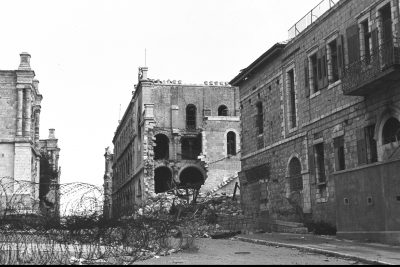×


We have detected your country as:
Please click here to go to the USA website or select another country from the dropdown list.
by: Joshua Spurlock, The Mideast Update
Fifty years ago, barbed wire and land mines divided Jerusalem between Jordanian and Israeli territory. That Jerusalem was starkly divided into “east” and “west” wasn’t the only thing that looked noticeably different under Jordanian control which lasted from 1949 until the 1967 Six Day War that saw Israel take back the entirety of Jerusalem. The reality of Jordan’s domination of “east Jerusalem” may very well prove surprising, including one generally unspoken historical fact: Despite being controlled by Arabs, east Jerusalem was never the capital of a Palestinian state.
Two different Middle Eastern experts used the same term to describe Jordan’s view of east Jerusalem during their control: “backwater.” Dr. Jonathan Spyer, director of the Rubin Center for Research in International Affairs in Israel’s Interdisciplinary Center (IDC) Herzliya, said Jerusalem was “relatively neglected” by Jordan. While it wasn’t “a kind of terrible oppression” for the Arabs living there, it was “a kind of stagnation.” Noted Dr. Spyer, “Obviously, Jordan’s capital is Amman, not Jerusalem. They had no interest in changing that.”
Despite that, Dr. Michael Oren, deputy minister in the Israeli prime minister’s office and the author of Six Days of War: June 1967 and the Making of the Modern Middle East,” said it wasn’t that Jordan’s Hashemite dynasty didn’t see Jerusalem as important—it was very important to control given it’s home to the third holiest site in Islam. Rather, Dr. Oren highlighted the distinguishing “between the holy sites and Jerusalem as a living city.”
Speaking of religion, contrasting religious access between Jordan’s control of Jerusalem’s holy sites and Israel’s today, Dr. Oren said the difference is “complete religious freedom for all three religions in the Old City. That wasn’t the case before 1967, certainly not for Jews. Period.” Jews were forbidden from visiting the Western Wall and all other Jewish holy sites in Jordan’s half of Jerusalem. And that wasn’t even the worst abuse by the Jordanians at the time. Dr. Oren noted Jordanian actions such as the destruction of the Jewish Quarter and ancient synagogues as well as the use of Jewish gravestones from the Mount of Olives as paving stones—in short, religious desecration.

Damaged buildings and east Jerusalem streets filled with barbed wire in the aftermath of the 1948 war (Photo:National Photo Collection / Government Press Office )
But perhaps one of the most unexpected elements of Jordan’s control of east Jerusalem and the biblical heartland of Judea and Samaria also known as the West Bank, is that Jordan annexed the area for themselves—and never established a Palestinian state. In some ways, circumstances favored Jordan on this point even though Dr. Oren noted Palestinians “did not like the Hashemite dynasty at all.” He said some of the radicals attempted a revolt against Jordan in 1955, but pointed out that while the Palestinians were involved in a variety of political movements—including pro-Egyptian and communist groups— they weren’t “as focused” on Palestinian statehood. Instead, there was hope Egypt would conquer Israel for the Palestinians until the 1967 war shattered that illusion and shifted the Palestinian aspirations to themselves.
Dr. Spyer compared the Palestinian national movement evolution to that of the other national movements in the region—such as the ones in Syria, Lebanon and Iraq that emerged out of the collapse of the Turkish Ottoman Empire and European colonialism. Dr. Spyer argued that, that doesn’t make it unusually new or “uniquely inauthentic,” but nonetheless it wasn’t something with which Jordan had to really contend.
The Palestinians are actually “much more” focused on the very creation of Israel and the 1948 war than the 1967 one, according to Dr. Spyer. He said that while it’s “not totally true” that the emergence of Palestinian nationalist identity was just in response to Jewish control of the territory, it is “fundamental” and “integral” to Palestinian identity, and a key differentiator for the Palestinians versus the Jordanians, who otherwise are very similar ethnically. A significant percentage of Jordanian citizens are in fact “Palestinians” who live there.
Given the Palestinian movement’s more united focus and self-interested emergence out of the 1967 war, Dr. Oren said, “The Palestinians in many ways are the biggest winners of the Six Day War.” The “relatively recent” emergence of a Palestinian national movement shifted the global view of the conflict and Jerusalem, noted Dr. Spyer. That took the world’s view of the city from an international unaffiliated city—as originally determined by the original United Nations’ plan— to a supposed Palestinian capital, despite the fact that it had never been such in all of history.
Dr. Oren simplified the change in world opinion on Jerusalem’s status: “I think that the answer is obvious; it has to do with [the fact that] the Jews won. The Palestinians are extraordinarily lucky that they have us as an enemy and not some Arab country. Look how many thousands of Palestinians have been killed in the Syrian war. No one seems to care about that.”
Both experts agreed the eastern portion of Jerusalem has been revitalized since 1967. Dr. Spyer pointed out Arab development in the capital and broader Judea and Samaria has been “galvanized” in areas such as electricity, water and education. And Dr. Oren noted that in Jerusalem, the Arab population has grown significantly since 1967. Contrasting the period under Jordanian control and today, Dr. Oren said, “Palestinians have streamed into Jerusalem since the Six Day War. They want Israeli identity cards. If you look across to the eastern part of the city, the majority of the buildings are new and white—that says it all.” And that certainly beats barbed wire and landmines.
All logos and trademarks in this site are property of their respective owner. All other materials are property of Bridges for Peace. Copyright © 2025.
Website Site Design by J-Town Internet Services Ltd. - Based in Jerusalem and Serving the World.